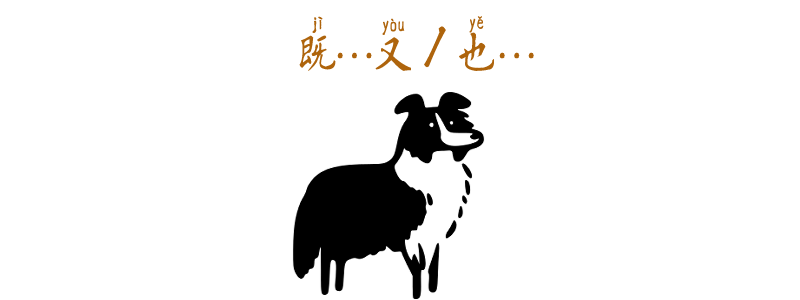Grammar Point:
In Chinese grammar, 既 jì… 又 yòu… and 既 jì… 也 yě… are used to express two qualities, actions, or conditions that exist simultaneously. Both structures are similar and function like “both… and…” in English.
Structure
既 jì + Adj + 又 yòu + Adj
這件衣服既好看又暖和这件衣服既好看又暖和
This outfit is not only stylish but also warm.
林老師的中文課既嚴格又無趣林老师的中文课既严格又无趣
Mr. Lin’s Chinese class is strict and boring.
我家狗既聰明又可愛我家狗既聪明又可爱
My dog is smart and adorable.
台灣的夏天既潮濕又悶熱,很容易有皮膚問題台湾的夏天既潮湿又闷热,很容易有皮肤问题
Taiwan’s summers are humid and muggy, so it’s easy to get skin problems.
學中文真的是既困難又有趣学中文真的是既困难又有趣
Learning Chinese is challenging and fun.
既 jì + V + 也 yě + V
他既不來上課也不請假,很快就會被退學了他既不来上课也不请假,很快就会被退学了
He doesn’t show up for class and doesn’t request leave either—he’s going to get expelled soon.
我既不是你女兒也不是你女朋友,你憑什麼管我我既不是你女儿也不是你女朋友,你凭什么管我
I’m neither your daughter nor your girlfriend, so why do you think you can tell me what to do?
我遲到了一個小時,可是他既沒生氣也沒問我為什麼我迟到了一个小时,可是他既没生气也没问我为什么
I was an hour late, but he didn’t get mad or even ask why.
你既不想吃亞洲菜也不想吃西方菜,你到底要吃什麼你既不想吃亚洲菜也不想吃西方菜,你到底要吃什么
You don’t want Asian food, and you don’t want Western food either. So what exactly do you want to eat?
我既沒有錢也沒有長相,我該怎麼辦?我既没有钱也没有长相,我该怎么办?
I have no money and no looks—what should I do?
Differences
既 jì… 又 yòu… is more formal and commonly found in written language or formal speech.
又 yòu… 又 yòu… is more commonly used in spoken language.


